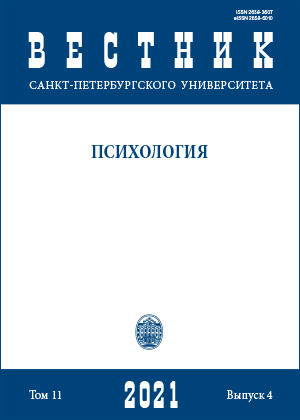Interrelation between parents’ and children’s cognitive styles in primary school and early adolescence
DOI:
https://doi.org/10.21638/spbu16.2021.405Abstract
The study aims to test the following hypothesis: cognitive styles (CS) of a mother and father are selectively associated with the severity of a child’s CS in primary school and early adolescence. As part of research for children’s CS (carried out by the method of longitudinal sections), data was collected on the problem of conjugation between parents’ and children’s style characteris- tics. CS were analyzed: impulsiveness — reflexivity (using the method “Comparison of similar drawings” by J.Kagan), field dependence — field independence (method “Gottschaldt’s Fig- ures”), rigid — flexible cognitive control (method “Verbal-color interference” by J. Stroop), narrow-wide range of equivalence (method “Free sorting of words” by V.Kolga). The sample consisted of 24 full families (48 parents) and their children (12 sons and 12 daughters); the hypothesis was tested using factor analysis of CS indicators. The obtained results indicate that in primary school and junior adolescence a child’s CS impulsiveness — reflexivity maintains a connection with the father’s CS, and in the CS field dependence — field independence in younger adolescence — with the mother’s CS, and in both styles this relationship has a positive character. In CS flexible-rigid cognitive control and in CS narrow — wide range of equivalence at the primary school age, both parents influence the formation of a child’s CS. In regard to CS in early adolescence, children and parents are no longer interconnected. It can be assumed that this indicates a different nature of СS: some styles are basic, and the connection with that this indicates a different nature of СS: some styles are basic, and the connection with the father or mother will, to one degree or another, persist in the future. And other styles are social, and with age their formation will be influenced by their social environment. Thus, this study raises questions about the need to clarify mechanisms for the formation of style behavior in ontogenesis, in particular, the influence of the family microenvironment factor. This factor can expand opportunities in the study of individual characteristics of mental activity, and also be taken into account in practical areas such as education, pedagogy, child psychology, etc.
Keywords:
cognitive styles of parents and children, impulsivity — reflexivity, narrow — wide range of equivalence, field dependence — field independence, rigid — flexible cognitive control, primary school age, early adolescence
Downloads
References
References
Downloads
Published
How to Cite
Issue
Section
License
Articles of "Vestnik of Saint Petersburg University. Psychology" are open access distributed under the terms of the License Agreement with Saint Petersburg State University, which permits to the authors unrestricted distribution and self-archiving free of charge.




